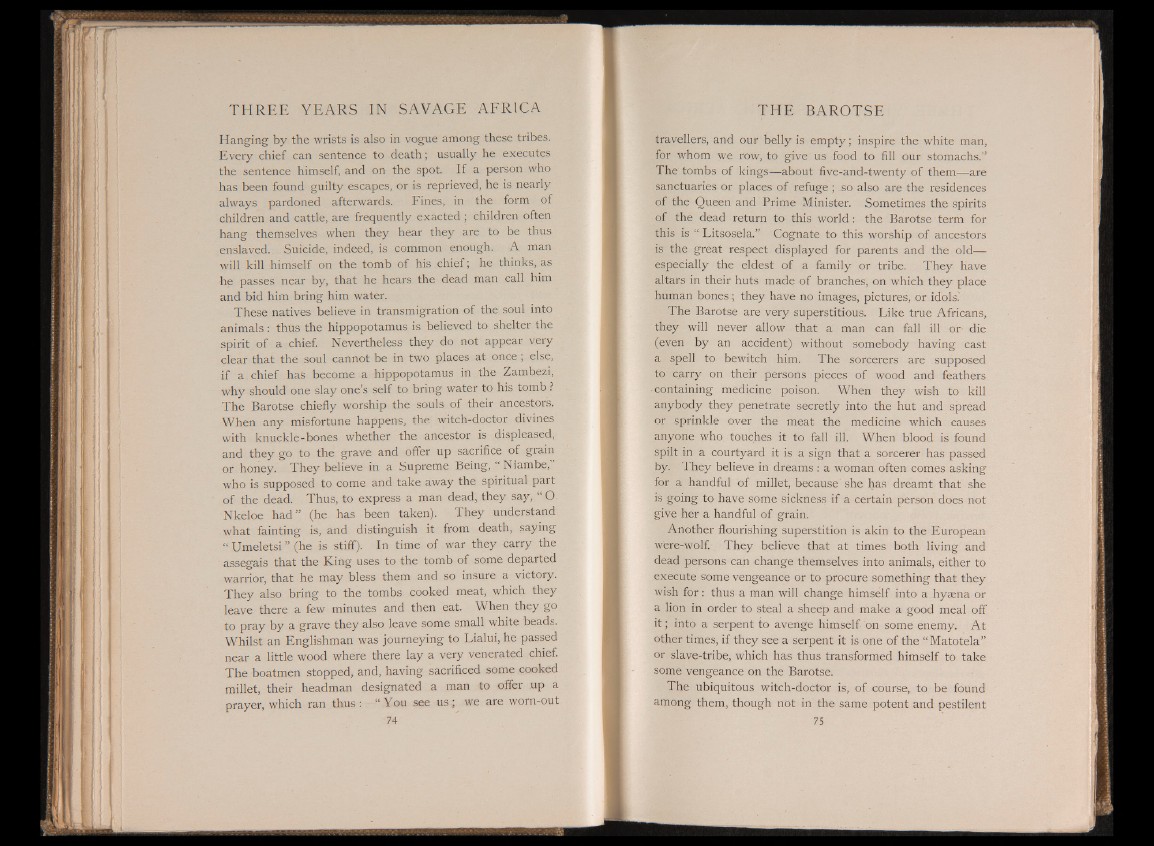
Hanging by the wrists is also in vogue among these tribes.
Every chief can sentence to death; usually he executes
the sentence himself, and on the spot. If a person who
has been found guilty escapes, or is reprieved, he is nearly
always pardoned afterwards. Fines, in the form of
children and cattle, are frequently exacted ; children often
hang themselves when they hear they are to be thus
enslaved. Suicide, indeed, is common enough. A man
will kill himself on the tomb of his chief; he thinks, as
he passes near by, that he hears the dead man call him
and bid him bring him water.
These natives believe in transmigration of the soul into
animals: thus the hippopotamus is believed to shelter the
spirit of a chief. Nevertheless they do not appear very
clear that the soul cannot be in two places at once; else,
if a chief has become a hippopotamus in the Zambezi,
why should one slay one’s self to bring water to his tomb ?
The Barotse chiefly worship the souls of their ancestors.
When any misfortune happens, the witch-doctor divines
with knuckle-bones whether the ancestor is displeased,
and they go to the grave and offer up sacrifice of grain
or honey. They believe in a Supreme Being, “ Niambe,
who is supposed to come and take away the spiritual part
of the dead. Thus, to express a man dead, they say, “ O
Nkeloe had” (he has been taken). They understand
what fainting is, and distinguish it from death, saying
“ Umeletsi ” (he is stiff). In time of war they carry the
assegais that the King uses to the tomb of some departed
warrior, that he may bless them and so insure a victory.
They also bring to the tombs cooked meat, which they
leave there a few minutes and then eat. When they go
to pray by a grave they also leave some small white beads.
Whilst an Englishman was journeying to Lialui, he passed
near a little wood where there lay a very venerated chief.
The boatmen stopped, and, having sacrificed some cooked
millet, their headman designated a man to offer up a
prayer, which ran thus: “ You see us; we are worn-out
74
travellers, and our belly is empty; inspire the white man,
for whom we row, to give us food to fill our stomachs.”
The tombs of kings—about five-and-twenty of them—are
sanctuaries or places of refuge; .so also are the residences
of the Queen and Prime Minister. Sometimes the spirits
of the dead return to this world: the Barotse term for
this is “ Litsosela.” Cognate to this worship of ancestors
is the great respect displayed for parents and the old—
especially the eldest of a family or tribe. They have
altars in their huts made of branches, on which they place
human bones; they have no images, pictures, or idols!
The Barotse are very superstitious. Like true Africans,
they will never allow that a man can fall ill or die
(even by an accident) without somebody having cast
a spell to bewitch him. The sorcerers are supposed
to carry on their persons pieces of wood and feathers
containing medicine poison. When they wish to kill
anybody they penetrate secretly into the hut and spread
or sprinkle over the meat the medicine which causes
anyone who touches it to fall ill. When blood is found
spilt in a courtyard it is a sign that a sorcerer has passed
by. They believe in dreams : a woman often comes asking
for a handful of millet, because she has dreamt that she
is going to have some sickness if a certain person does not
give her a handful of grain.
Another flourishing superstition is akin to the European
were-wolf. They believe that at times both living and
dead persons can change themselves into animals, either to
execute some vengeance or to procure something that they
wish for: thus a man will change himself into a hyaena or
a lion in order to steal a sheep and make a good meal off
it ; into a serpent to avenge himself on some enemy. At
other times, if they see a serpent it is one of the “Matotela”
or slave-tribe, which has thus transformed himself to take
some vengeance on the Barotse.
The ubiquitous witch-doctor is, of course, to be found
among them, though not in the same potent and pestilent